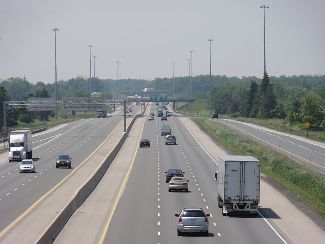Effectiveness of Temporary Policies Aimed at Reducing Petrol Consumption

At the end of February 2011, in a context of rising oil prices and growing imbalance of the energy trade, the Spanish government announced a set of measures aimed at reducing petrol consumption, which went into practice at the beginning of the following month:
- a 5% reduction of prices of suburban rail services (Renfe Cercanías), which was extended afterwards to all public transports in Asturias and Barcelona.
- stricter speed limits on highways which were reduced from 120 kph to 110 kph.
- an increase in the biofuel contents of petrol used by all vehicles.
The two first measures had a limited temporary scope, given that when announcing them the government stated that they would be valid only until the end of June of the same year.
The government did not offer any forecast of the expected effectiveness of the measures, stating only that the reduction of speed limits would, on its own, reduce petrol consumption by 15%. Given that an ex post calculation of their impact has not been carried out, the research project aims at quantifying it using publicly available information. The results of such analysis make it possible to increase our knowledge of the economic behaviour of individuals in transport markets when they have to face different types of policies or incentives.
The research methodology relies on the econometric estimation of a petrol consumption function that includes a set of explanatory variables of consumption (stock of cars and motorcycles, employment, petrol and public transport prices, holiday periods and biofuel contents), making it possible to obtain an estimate of the impact of the different policies. The data are monthly observations of 48 provinces (all but those of the Canary Islands) for the 2008-2011 period.
Results show that although the measures contributed to a reduction of petrol consumption, their effect was much lower than that expected by the government. Thus, the new speed limits reduced petrol consumption by less than 3%, while the temporary reductions of public transport fares did not have significant impacts. This result is explained by the temporary character of the policy: had it been a permanent one, petrol consumption would have fallen by 0.5%. Finally, the results also show that for every percentage point increase in the biofuel contents of gasoline, its consumption falls by 0.6%.
Besides showing the ability to carry out quantitative analyses of policy impacts, this research has revealed the low effectiveness of transport policies aimed at reducing private car use when the measures are temporary.
References
Asensio, Javier; Gómez-Lobo, Andrés; Matas, Anna. How effective are policies to reduce gasoline consumption? Evaluating a set of measures in Spain. Energy Economics 42: 34-42. 2014. DOI: 10.1016/j.eneco.2013.11.011.

